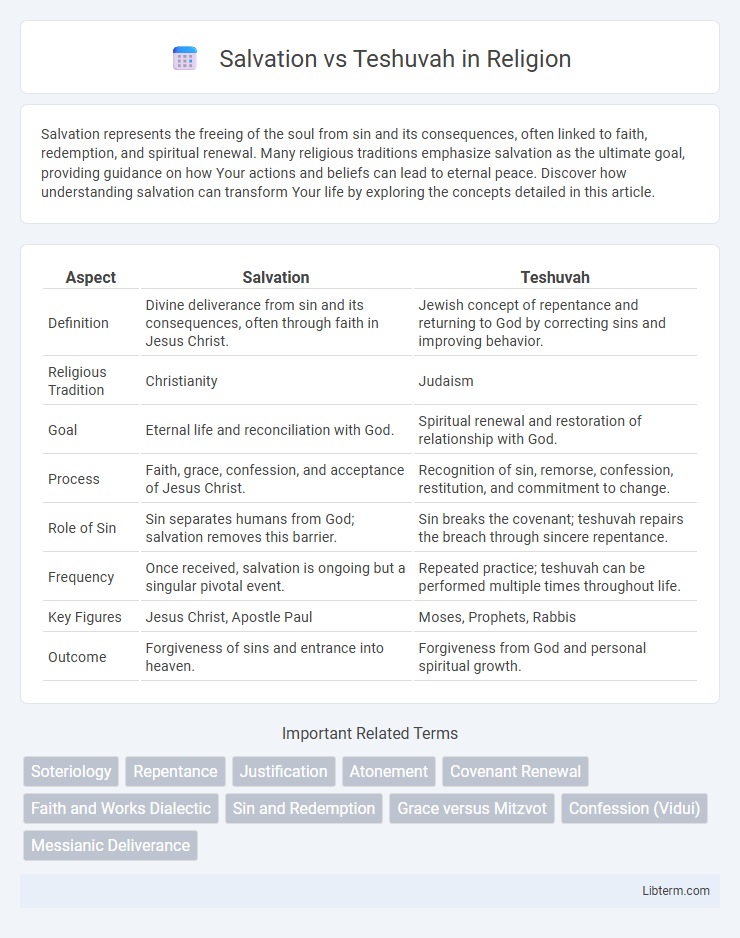Salvation represents the freeing of the soul from sin and its consequences, often linked to faith, redemption, and spiritual renewal. Many religious traditions emphasize salvation as the ultimate goal, providing guidance on how Your actions and beliefs can lead to eternal peace. Discover how understanding salvation can transform Your life by exploring the concepts detailed in this article.
Table of Comparison
| Aspect | Salvation | Teshuvah |
|---|---|---|
| Definition | Divine deliverance from sin and its consequences, often through faith in Jesus Christ. | Jewish concept of repentance and returning to God by correcting sins and improving behavior. |
| Religious Tradition | Christianity | Judaism |
| Goal | Eternal life and reconciliation with God. | Spiritual renewal and restoration of relationship with God. |
| Process | Faith, grace, confession, and acceptance of Jesus Christ. | Recognition of sin, remorse, confession, restitution, and commitment to change. |
| Role of Sin | Sin separates humans from God; salvation removes this barrier. | Sin breaks the covenant; teshuvah repairs the breach through sincere repentance. |
| Frequency | Once received, salvation is ongoing but a singular pivotal event. | Repeated practice; teshuvah can be performed multiple times throughout life. |
| Key Figures | Jesus Christ, Apostle Paul | Moses, Prophets, Rabbis |
| Outcome | Forgiveness of sins and entrance into heaven. | Forgiveness from God and personal spiritual growth. |
Defining Salvation and Teshuvah
Salvation in religious contexts typically refers to deliverance from sin and its consequences, often emphasizing divine grace and redemption through faith or divine intervention. Teshuvah, a central concept in Judaism, means "return" and involves sincere repentance, self-reflection, and commitment to change one's behavior to restore a righteous relationship with God. While salvation often highlights external rescue, teshuvah centers on internal transformation and moral accountability.
Historical Origins of Salvation and Teshuvah
Salvation in Christian theology originates from early Jewish concepts of deliverance, evolving through the teachings of Jesus Christ and the apostolic writings emphasizing faith and grace. Teshuvah, rooted in ancient Hebrew tradition, represents repentance and return to God, with origins tracing back to biblical calls for moral and spiritual renewal in the Torah and prophetic literature. Both concepts underscore transformation but reflect different historical and cultural frameworks within Judaism and Christianity.
Theological Foundations: Christianity vs Judaism
Salvation in Christianity centers on faith in Jesus Christ as the Redeemer who grants eternal life, rooted in grace and the atonement of sins through His sacrifice. Teshuvah in Judaism emphasizes repentance, return, and spiritual transformation, relying on personal responsibility, prayer, and ethical conduct to restore one's relationship with God. The theological foundation contrasts Christianity's unconditional divine grace with Judaism's emphasis on human free will and continual self-improvement within the covenantal framework.
Key Scriptural References
Salvation in Christian theology is primarily grounded in Ephesians 2:8-9, highlighting grace through faith in Jesus Christ as the means to eternal life. Teshuvah, central to Jewish thought, emphasizes repentance and return to God, rooted in scriptures like Ezekiel 18:30-32 and Deuteronomy 30:2-3, calling for heartfelt transformation and obedience. Both concepts underscore divine mercy, yet salvation centers on faith's role, while teshuvah stresses active personal repentance and covenant renewal.
The Role of Repentance in Salvation and Teshuvah
Repentance serves as a crucial turning point in both salvation and teshuvah, acting as a transformative act that restores the relationship between the individual and the divine. In Christian theology, salvation is often understood as a gift received through faith, with repentance functioning as a heartfelt acknowledgment of sin and a commitment to change. In Judaism, teshuvah involves a comprehensive process of self-examination, remorse, and making amends, emphasizing active steps toward spiritual renewal and reconciliation with God.
Personal Transformation: Similarities and Differences
Salvation and Teshuvah both involve profound personal transformation, with salvation emphasizing redemption through faith and divine grace, leading to spiritual renewal and eternal life. Teshuvah centers on sincere repentance and returning to a righteous path, highlighting self-accountability and ethical change within Jewish tradition. While salvation often implies an external, divine act of saving, teshuvah requires active personal effort and introspection to achieve moral and spiritual restoration.
Community and Ritual Practices
Salvation in many religious traditions often emphasizes faith and individual redemption, while Teshuvah in Judaism centers on communal responsibility and ritual practices to restore relationships with God and others. Teshuvah involves structured rituals such as prayer, fasting on Yom Kippur, and acts of charity that engage the entire community in a collective process of repentance and renewal. These practices reinforce social cohesion and shared spiritual accountability, contrasting with the more individualized experience of salvation found in some other faiths.
Salvation and Teshuvah in Modern Life
Salvation in modern life often emphasizes spiritual deliverance and eternal life, reflecting diverse religious interpretations centered on grace, faith, and divine intervention. Teshuvah, rooted in Jewish tradition, involves sincere repentance, self-reflection, and ethical transformation, highlighting personal responsibility and moral repair in daily living. Both concepts converge in contemporary spirituality through the pursuit of inner renewal and conscious alignment with higher values.
Common Misconceptions
Salvation is often misunderstood as a one-time event, while Teshuvah, the Jewish concept of repentance, emphasizes continuous self-improvement and return to God. Many mistakenly equate salvation strictly with divine intervention, overlooking Teshuvah's active personal responsibility and moral transformation. This misconception blurs the distinct theological frameworks in Christianity and Judaism regarding forgiveness and spiritual renewal.
Bridging Understanding Between Faiths
Salvation in Christianity centers on divine grace and Jesus Christ's sacrificial atonement, while Teshuvah in Judaism emphasizes personal repentance and returning to God through ethical actions. Bridging understanding between these faiths involves recognizing salvation's transformative power alongside Teshuvah's ongoing moral responsibility, highlighting complementary pathways to spiritual renewal. Exploring these concepts fosters interfaith dialogue by respecting distinct religious narratives and shared values of forgiveness and redemption.
Salvation Infographic

 libterm.com
libterm.com